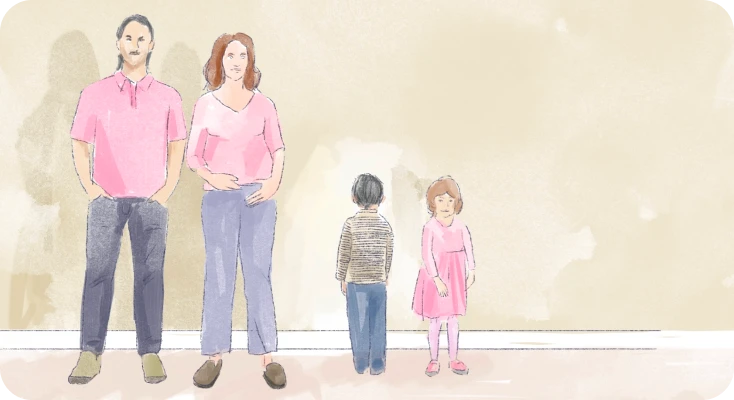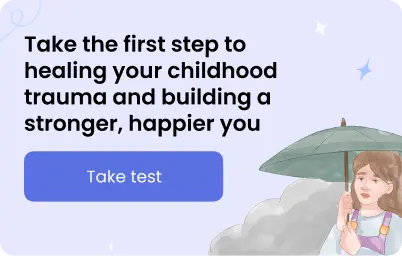Do you often feel ignored and invisible in your own family? The lost child syndrome describes a child who adapts to family dysfunction by becoming emotionally withdrawn, avoiding conflict, and suppressing their own needs. This role is often found in families with addictions, violence, or emotional neglect.
Typically, the lost child in a dysfunctional family tries to protect themselves from the frustration and anxiety associated with their trauma. Their only way to cope is often to stay quiet and still, hoping the bad situation will eventually end or hoping they will go unnoticed by those engaged in trauma-inducing situations or conflict.
In most cases, the lost child syndrome can affect the person’s sense of identity, self-worth, and mental health.
Lost Child Syndrome quiz
Usually, the lost child role belongs to the third-born. However, it can be any child, from eldest to youngest, who may also have traits of middle child syndrome.
Understanding lost child syndrome can help you reclaim your voice, validate your emotions, and build meaningful relationships.
Question 1: Do you often feel overlooked or unnoticed in your family or social circles?
Question 2: Is it difficult for you to ask for help, even when you need it?
Question 3: Do you feel your emotional needs are always ignored or undervalued?
Question 4: Do you tend to “disappear” or “blend in” in social settings, preferring to stay under the radar rather than stand out?
Question 5: Do you often tend to withdraw from conflict or intense emotions?
Question 6: Do you feel disconnected from the people closest to you, even when you’re physically present?
Question 7: Are you often the peacemaker or avoidant when family or social tensions arise?
Question 8: Do you feel a lack of direction or purpose in your life, as though you’re not sure where you belong?
Question 9: Do you feel you’re not allowed to make mistakes or show vulnerability in your family or social situations?
Question 10: Do you struggle to form close, trusting relationships because you fear being let down or ignored?
If you answered “yes” to more than 4 of these questions, this article may be particularly relevant for you. It will explore the emotional impact of lost child syndrome and its signs and provide strategies to help you heal and reconnect with your emotional self.
Are the scars of childhood trauma still with you? Take the first step toward healing.
7 signs of lost child syndrome
As the impact of invisible child syndrome can be profound and long-lasting, it’s important to identify elements of its internal narrative.
1. You escape by daydreaming and fantasizing
For children who experienced neglect in a family, daydreams may become an escape from the painful points of their reality.
They may seek fulfillment elsewhere, including through fantasy about relationships, adventures, or scenarios where they feel wanted or accepted.
For example, a common fantasy for adults with lost child syndrome is the dream of a loving, ideal family—one where they are seen, heard, and cared for.
These fantasies might include imagining a future where they have their own children and can provide the care they didn’t receive.
Or, people with lost child syndrome might dream of having a supportive family that makes up for the emotional neglect they experienced as kids.
2. You have a core belief that people are too unreliable and unstable
For adults who grew up with lost child syndrome, one of the lasting psychological traits may be a deep-seated belief that people are unreliable. This trait is also common for lost children of narcissistic families due to an inconsistent stream of support and empathy from their parents.
Typically, for a person with lost child syndrome, the belief that people are unstable is a defense mechanism to protect themselves from further hurt. However, it can also create barriers to connection and intimacy.
For example, people with invisible child syndrome may intensely refuse to seek help from family or friends during a difficult time because they believe those people will let them down.
Ironically, some adults with lost child syndrome may find themselves in relationships with people who confirm their belief that others are unreliable.
They may unconsciously gravitate toward partners who are emotionally unavailable, inconsistent, or unpredictable to affirm the lens through which they experience the world and those around them. This is an example of a self-fulfilling prophecy.

3. It’s hard for you to say “no”
Most people with invisible child syndrome are caring and generous, especially to those they love. However, this can be harmful because they often give too much of themselves and ignore their own needs.
This behavior is also typical for people with adult child syndrome. The reason they tend to sacrifice themselves is that, as children, they didn’t ask for or receive much from their caregivers, nor were healthy boundaries around self-care modeled appropriately.
As a result, people with lost child syndrome often struggle with setting boundaries or saying “no.”
We asked Katherine Scott, M.Ed/Ed.S, LMFT, how the inability to defend their boundaries can show up in people with lost child syndrome. Boundary setting requires a certain level of vulnerability and trust in those impacted by the boundary. There is a saying that ‘those who react poorly to our boundaries benefitted from us having none’ and this rings true for those who experience lost child syndrome. In the past, boundary setting may have led to conflict within their dysfunctional family system. Typically, the conflict has not been deemed ‘worth it’ and self sacrificing of needs has been the less conflictual route.
4. You feel like a burden to others
As adults, people with lost child syndrome may constantly feel like their presence is unwanted. Or, they may feel like they are causing inconvenience by simply being themselves. This may be related to their hyper-independence as a trauma response to betrayal or neglect in childhood.
Another reason for this behavior may be that a person who was emotionally distant, otherwise known as cold mother syndrome raised them. Feeling like a burden, in turn, can deeply affect one’s relationships and a sense of self-worth. Consequently, people with lost child syndrome may avoid asking for help or support, fearing that others will view them as a burden.
Another expression of feeling like a burden is difficulty accepting positive attention from others. When someone tries to compliment or show care toward a person with lost child syndrome, they may downplay it or become extremely uncomfortable or anxious with the attention.
The reason is they often can’t believe they are worthy of unconditional love or attention. The underlying belief is that they are only worth what they can give. Not because of who they are. For instance, a person with lost child syndrome may respond to a compliment like, “You look great today,” with, “Oh, it’s nothing,” or, “I’ve just been really stressed.”
They often don’t feel comfortable accepting kindness or praise. In the past, praise or positive attention may have been weaponized at a later date or held against them.
5. You have imposter syndrome
Continuing with the previous point, people with invisible child syndrome who feel like a burden often experience imposter syndrome. When ignored or undervalued as children, they develop a habit of believing that their success is merely a coincidence.
They don’t believe that they can earn recognition or love. They may feel undeserving of success, affection, or recognition. Therefore, they might constantly second-guess their place in social or professional environments.
The reason is they feel that they are “faking it” or that they don’t truly belong. This, in turn, can lead to chronic feelings of guilt or anxiety, especially when others offer support or show appreciation.
For instance, an adult with lost child syndrome who gets praise at work might feel anxious or uncomfortable, worrying that they don’t deserve it and that their coworkers will soon discover they are “not good enough.”
6. You have a guilt complex
Moreover, adults with invisible child syndrome may feel like they need to keep working—be it chores, projects, or tasks—because they can’t relax or enjoy free time without feeling guilty or anxious. Even if they’re physically exhausted, they may believe that relaxation is selfish or irresponsible.
The reason is that growing up, people with lost child syndrome often had to be self-sufficient. Or they felt ignored or undervalued when they expressed their needs.
As a result, they may feel they don’t deserve relaxation, or they might see it as a luxury they cannot afford. For this reason, the fear of being “lazy” may extend into adulthood, where they struggle to justify relaxation or leisure time, feeling worthless if they are not constantly “productive” or active.
7. You have a strong attachment to animals and belongings
Another trait of a lost child’s family role is deep emotional bonds with pets and sentimental items.
As adults, people with lost child syndrome may find emotional security in things or animals that cannot judge them. They may feel that these objects provide immediate and unconditional love or are predictable in ways that human relationships are not.
Thus, animals and things become safe places. They allow a person with invisible child syndrome to express themselves without feeling like a source of burden to anyone else.
Typically, the lost child in a dysfunctional family may feel overwhelming sadness or frustration. They may even think, “I hate my family,” but choose not to share it with others.
Instead, they might spend hours tending to a pet or engaging in a solitary activity like gardening, where they can channel their emotions without ridicule, backlash, or judgment.
In the same way, an adult with invisible child syndrome may have a collection of objects that they feel emotionally connected to. It may be old photographs or childhood toys. These items help them feel grounded and give them a sense of emotional safety.
Healing lost child syndrome
Dealing with the lost child syndrome takes time. But with self-care, support, and awareness, you can heal and grow. Here are some steps to help:
Katherine Scott, a Licensed Marriage and Family Therapist, explained how to overcome being a lost child. Overcoming a ‘lost child’ role and mentality takes commitment to rewriting how you see yourself in relation to others. Many times, those who struggle with the mindset that accompanies lost child syndrome view getting close to others as a liability. Solitude is often the quick fix but also the crux for the deep insecurities and pain points the past brings. Finding a trustworthy therapist can be a great first step into exploring different perspectives on how to navigate relationships with authenticity. It’s recognizing our value is not attached to the way others have treated us in the past. It’s how we show up in relationships in the present that are reinforced with healthy boundaries, permission to stay no, and clear communication that create evidence there is a safe space for us in the world to be celebrated and loved unconditionally.
1. Reflect on how neglect or isolation affected you
You can start by getting to know how your childhood affects you and your presence now. The best way is to reflect with self-discovery tests and try journaling your thoughts and patterns.
If you want an all-in-one app for people who want to get to know more about you, Breeze might be the best choice. At first, you can take the lost inner child test. The questions and results can help you spot patterns and emotions you might not realize are rooted in your childhood.
Besides this test, Breeze offers many other science-based tests that can help people learn more about their emotions and temperament. Some of these tests are “imposter syndrome,” “temperament type,” and “extraversion/introversion.” All your results can be written in a journal, it’s another feature the app offers.
2. Try expressive writing
Writing about their childhood can help people with invisible child syndrome process the past. The research found that people with varied medical illnesses and anxiety who wrote online for 15 minutes three days a week for 12 weeks had higher well-being and fewer depressed symptoms after one month. Journaling improved their mental health after 12 weeks. [1]
Focus on moments when you felt overlooked or unsupported, and explore how those experiences shaped you. Consider situations where you feel abandoned and rejected as an adult. These triggers often relate to unresolved childhood trauma.
Write down the event and the emotions you feel (e.g., guilt, regret).
- Prompt: “What happened? What do I feel about it?”
Eventually, identifying these behaviors helps you understand how your past affects your present.
3. Challenge self-blaming thoughts
Sometimes, people with lost child syndrome blame themselves. That’s why it’s important to recognize that the neglect you experienced wasn’t your fault. You were a child who needed care and love, and you deserve it now.
Start by challenging your self-blaming thoughts with this easy yet effective CBT exercise:
- Identify self-critical thoughts (e.g., “I’m a bad person”) and ask: Is this thought factual or overly harsh?
- Replace with balanced thoughts like: “I made a mistake, but I can learn and grow from it.”
4. Nurture your inner child
Take a moment to picture yourself as a child. What did you look like? What were your dreams, fears, and needs? Recognizing this version of yourself helps create a bridge to healing. Pay attention to any feelings of sadness or anger that arise when thinking about your childhood. These emotions are often tied to unmet needs or unprocessed experiences from your past.
After that, write a letter to your younger self in which you show support, empathy, and understanding. Admit that they are hurting, validate their feelings, and offer words of comfort. This CBT exercise allows for a deeper connection with your inner child and can foster healing and integration, according to the newest research.[2]
5. Ask for help if you feel so
Working with a therapist can help you process unresolved emotions, reframe negative beliefs, and learn healthier coping strategies. Therapy also provides a safe space to work through painful memories without judgment.
Here are some approaches that will help with childhood trauma and lost child syndrome:
- Trauma-Focused Cognitive Behavioral Therapy (TF-CBT): a short-term therapy designed for adults dealing with trauma. It combines cognitive-behavioral techniques with trauma-sensitive strategies. It helps address distorted beliefs and negative feelings related to the trauma; improve coping mechanisms, and restore trust.
- Eye Movement Desensitization and Reprocessing (EMDR): A specialized therapy that uses guided eye movements to help the brain reprocess traumatic memories. The main perk it does not require detailed verbal recounting of trauma, which can feel safer. Mental Health (NIMH) found that trauma-focused therapies, such as EMDR, reduced PTSD symptoms in more than 75% of participants. [3]
- Somatic Experiencing (SE): A body-focused therapy that helps release trauma stored in the nervous system. This approach focuses on physical sensations to process trauma safely, especially for those who “freeze”. This can be a familiar trauma response for those who have lost child syndrome.
Sources used:
- JMIR Mental Health: “Online Positive Affect Journaling in the Improvement of Mental Distress and Well-Being in General Medical Patients With Elevated Anxiety Symptoms: A Preliminary Randomized Controlled Trial.”
- Day, Melissa & Hine, Jasmine & Wadey, Ross. (2022). A letter to my younger self. Qualitative Research in Sport, Exercise and Health
- Shapiro F. The role of eye movement desensitization and reprocessing (EMDR) therapy in medicine: addressing the psychological and physical symptoms stemming from adverse life experiences. Perm J. 2014
Disclaimer
This article is for general informative and self-discovery purposes only. It should not replace expert guidance from professionals.
Any action you take in response to the information in this article, whether directly or indirectly, is solely your responsibility and is done at your own risk. Breeze content team and its mental health experts disclaim any liability, loss, or risk, personal, professional, or otherwise, which may result from the use and/or application of any content.
Always consult your doctor or other certified health practitioner with any medical questions or concerns
Breeze articles exclusively cite trusted sources, such as academic research institutions and medical associations, including research and studies from PubMed, ResearchGate, or similar databases. Examine our subject-matter editors and editorial process to see how we verify facts and maintain the accuracy, reliability, and trustworthiness of our material.
Was this article helpful?




